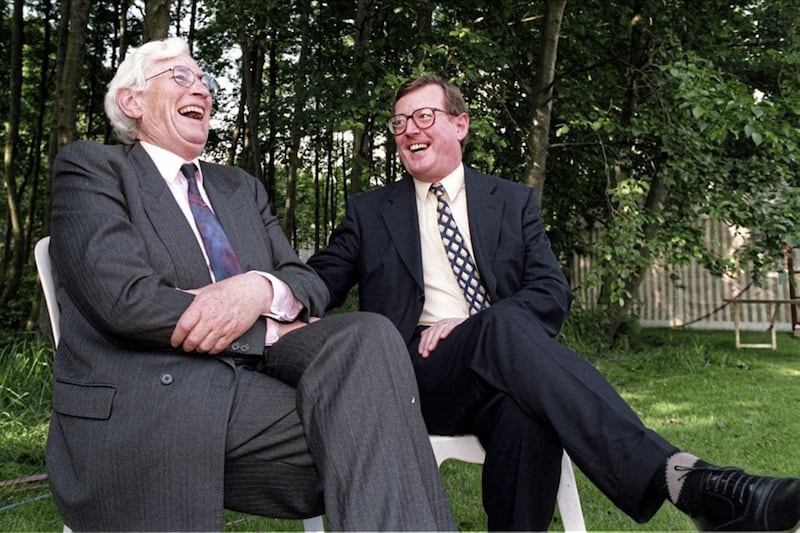In the early hours of March 3 2017, live on air, before the count had finished for the assembly election and with the final results yet to be declared and mulled over, Mike Nesbitt let it be known that he was standing down as leader of the UUP. It came as a shock to a number of candidates who were still waiting for first declarations and who began sending me text messages about what was happening while I was trying to make sense of it all in a TV studio.
Yet within a couple of hours of the ballot boxes being opened it was clear that the UUP was going to have a bad night. It eventually came in fourth in seat numbers; two behind the SDLP and only two ahead of Alliance. There had been reasonably high hopes at the outset of the campaign that the UUP would do fairly well; but those hopes were dashed when Nesbitt — again live on air and without clearing it with his colleagues — said he would give the SDLP his second preference before transferring to other unionist candidates.
So, here’s the question: what can Nesbitt, if he returns to the leadership of the UUP, do now that he couldn’t do during his last stint between 2012 and 2017? He would be taking over at a time when the general election result was as underwhelming as the 2017 assembly result. Fair enough, Robin Swann was elected, but elsewhere the results were disappointing. In seat after seat the party underperformed: and did so at a moment when the DUP was at its lowest ebb in decades and when the Alliance ‘surge’ seemed to have ebbed. And a LucidTalk opinion poll this week placed the party just three points ahead of the TUV.
- Mike Nesbitt will face the same old challenges in his second go as UUP leader - Alex KaneOpens in new window
- Here’s how the next UUP leader can fix the party - Alex KaneOpens in new window
- We should be mad as hell with the Stormont executive and we shouldn’t take it anymore - Alex KaneOpens in new window
His supporters are already suggesting that he will prioritise reform of the party — a line that a long list of UUP leaders since Terence O’Neill has trotted out. But reform is the internal, behind-the-scenes stuff and I’m not persuaded it has a significant impact on voters (and quite often it just annoys sections of the membership). What voters need to know is what, precisely, the UUP stands for. What marks it out from other unionist/pro-union parties? How will its policies will build support and attract new voter demographics?
That means Nesbitt needs to take the battle to the DUP and the TUV. If the party continues to be seen to cosy up to those electoral opponents — the DUP in particular — it will fail to attract back those pro-union voters who have already shifted to Alliance or who are simply choosing to stay at home. In 2015 he struck a deal with the DUP which Peter Robinson described as the “most comprehensive electoral arrangements between the two parties in the last 29 years”. Will we see that sort of relationship again? What matters most to him: a unionist of any variety elected, or the prioritisation of the UUP policies, values and candidates?
Another question: can he rebuild, reposition, reinvent and repair the UUP if he is also health minister? The challenges facing our health service and care system don’t need to be rehearsed again in this column because the sheer scale of them is obvious to just about everyone, not least the substantial numbers on waiting lists and their families. I’m not suggesting you can’t be a party leader and an executive minister (Reg Empey was minister for employment and learning while he was leader), but the health minister’s portfolio is on an altogether different level of pressure.
If the UUP continues to be seen to cosy up to those electoral opponents — the DUP in particular — it will fail to attract back those pro-union voters who have already shifted to Alliance or who are simply choosing to stay at home
Is it even possible for a UUP leader to take the party by the scruff of the neck and put it back on its feet if the party remains within the executive? What electoral gains are there for the party if SF and the DUP run the show, claim the credit for most of the popular decisions and then spread any manure for indecision or cuts over the smaller parties. Leader of the opposition, working cooperatively with the SDLP, strikes me as an option worth considering at this point. Being in a position to offer something different at the next assembly election also strikes me as a good option.
I know the UUP very well. I know it as a party which likes to break its leaders when it gets the chance — indeed it broke every one of them from O’Neill onwards. Has Nesbitt got what it takes to take on and break the breakers? More important, is the bulk of the party going to let him do what he knows needs to be done? For Nesbitt himself: has he finally learned the dangers of his occasional off-the-cuff reactions and ‘moments’ of impetuosity?









